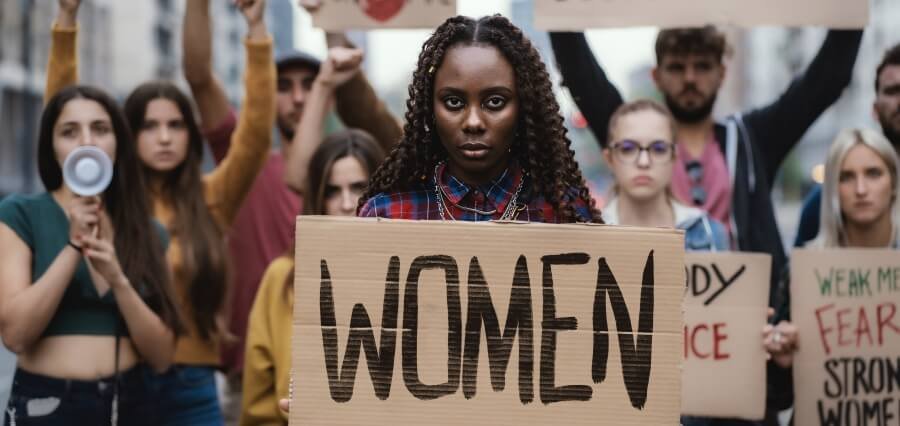Women’s rights have never been merely a social movement; they have always been the basis of creating societies that are fair, just, and progressive. Equality and empowerment do not pertain only to the individual but also refer to the collective advancement of families, communities, and nations. On top of being a matter of fairness, recognition of women’s rights is a transformational change that lifts up education, health, politics, and the economy.
Women had to struggle persistently for a very long time to gain their rightful place in society from ancient history to the present era. And though achievements have been accomplished, the goal of genuine parity still remains a problem of continuous struggle. The battle for women’s rights is still ongoing, with the issue’s relevance as a major factor in discussions about democracy, justice, and social progress.
The Journey of Women’s Rights Through History
To understand women’s rights, we need to understand the situation in the past times when these issues appeared. For many centuries, women were denied access to education, the right to own property, and the right to be involved in the government. They were given housewife roles and were voiceless in business and politics. The suffrage movement that took place in the 19th and early 20th centuries was among the initial triumphs of the battle for women’s rights as it confronted systematic exclusion and requested political voice. Besides social reformers, activists, and celebrities, millions of brave women from different countries of the world also participated in the struggle against oppressive norms and paved the legal way for recognition and equality.
On the other hand, the trip was not really straight. While some countries perhaps enacted reforms earlier than the others, some were still so deeply steeped in traditions that they tightly controlled women’s personal liberties. Even now with all the constitutional guarantees, women are not free from obstacles in getting jobs, taking leadership positions, and bodily autonomy. Since women’s rights were not just events from the past but also ongoing and still influencing our world, their history had to be told beyond the past.
Why Women’s Rights Are Human Rights
“Women’s rights are human rights” means that human rights, respect, and equality do not vary according to a person’s gender. Apart from being an insult to the very idea of morality and ethics, denying women half of the earth fundamental human rights is going to hinder progress in society.
The societies in which women’s rights are respected usually thrive in many areas. Educated women become more effective contributors to the workforce, thus breaking the cycle of poverty and allowing the economy to grow. Furthermore, politically empowered women are instrumental in decision-making, as they ensure that laws and policies take into account the needs of different groups of people. Additionally, providing for women’s rights is a guarantee of good health, as it will be safer and healthier for women if they have free access to health care and the full range of reproductive choices.
The reality is straightforward: strong democracies and societies that are more stable are the outcomes of countries that put women’s rights first.
Political Representation and Women’s Rights
Governance will fail to be inclusive if women’s voices are out of the question. One of the most fundamental issues in women’s rights concerned by political representation is the extent of women’s participation in politics. Despite the worldwide problem, women are still not given enough seats in the parliament, ministries, and administration. Recently, the power and positions that women gain and the policies that they bring to the forefront of the political agenda usuallyresult in social justice and community-based administration.
Just by pushing for family-friendly legislation and being a spokesperson for the stricter laws against gender-based violence, female activists introduce the distinctive angles of a political scenario. On the contrary, the decision to open up the way for women to engage in politics is not only a matter of mere symbolic representation politics, but it is also about the establishment of governments that would be fair to all the citizens of the country.
Social Progress and Everyday Lives
The matter of women’s rights has nothing to do with the grandness of the political movements nor landmarked laws; it is the daily living, working, and dreaming of women without any sort of fear or prejudice. Whether it is women’s liberty to take the career path they want, the right to marriage under their own terms, or the ability to walk at night without fear, those simple freedoms are the very embodiment of equality.
Supporting women’s rights helps to change the widely accepted norms and deeply rooted stereotypes as well. It means questioning why some jobs have been labeled “male-dominated” or why the role of the primary caregiver is most of the time filled by women. The social progress depends on eliminating these biases and fostering a climate where individuals advance because of their abilities and ambitions rather than their gender.
The Global Struggle for Women’s Rights
The women’s rights movement spread all over the world and was culturally, socially, and politically different. In some countries, the primary point of concern is still limited to the right to education and freedom from forced marriage. In others, the issue has moved to workplace equality, reproductive rights, and protection from sexual harassment. Albeit the conflicts are different, the main idea of universality is still there; every woman, no matter where, has the right to live with dignity.
Supporting organizations and governments operating across borders have largely contributed to elevating women’s voices. Nowadays campaigns for gender equality are present on various social platforms; hence, they are not only a concern of a particular place but a global issue. These talks call for us to keep in mind that only through being together in good times and bad can we really rebuild our communities.
Building the Future Together
Women’s empowerment is not an advantage or a prize given to some selected individuals but rather a basic necessity for the overall progress of humanity. When women are safe, educated, and empowered, then communities, in general, will thrive and prosper. Societies that take on the challenge of gender inequalities open up to the possibility of increased creativity, stronger economies, healthier families, and more democratic governments that are reflective of the people’s will.
Nevertheless, the path is still very long. The inheritance of progress as well as the unresolved issues from the preceding generations falls into the hands of the current generation. It is then up to the different stakeholders, such as individuals, governments, and institutions, to ensure that women’s rights are not only kept on the social and political agendas but advanced as well. Only then can we say we are getting closer to living in a world where equality is not merely a dream but is actually experienced by all people.




